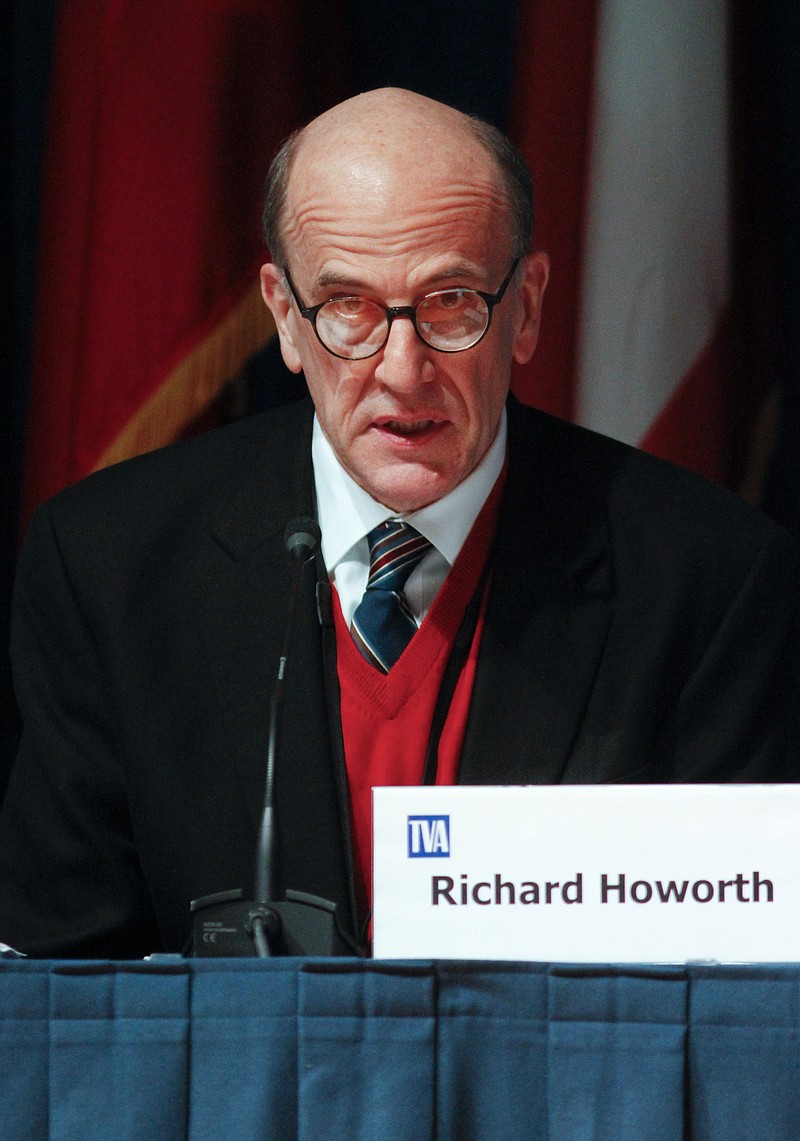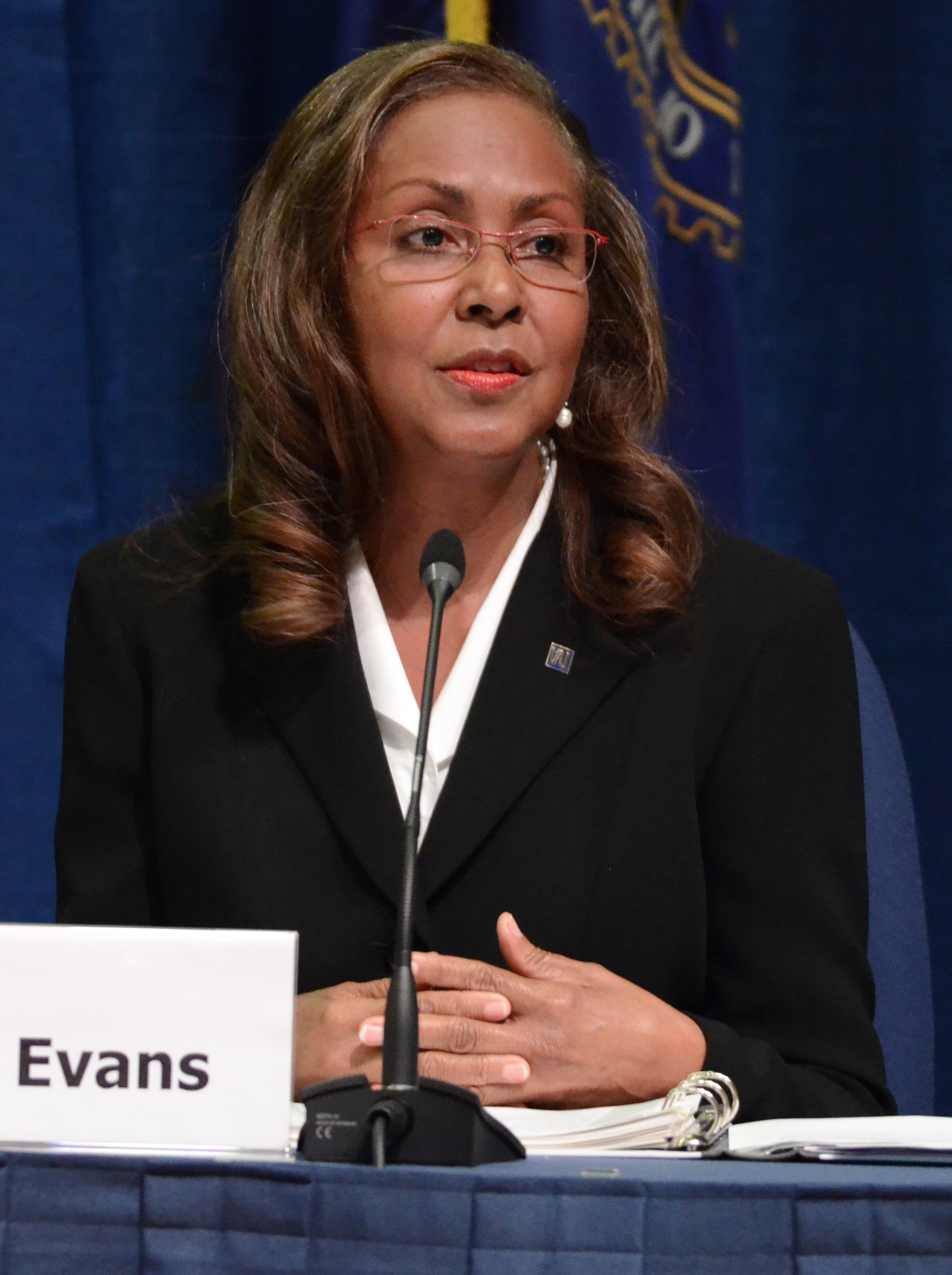Memphis accountant Lynn Evans became the first woman and the first African-American to ever preside over the Tennessee Valley Authority board on Thursday.
But Evans' term as TVA chair also will be one of the shortest.
Because Evans' term as a TVA director expires in May, the TVA board Thursday elected former Oxford, Miss., Mayor Richard Howorth as the next TVA chairman, effective May 19.
Howorth, who will serve as chair of the TVA board until May 2019, owns a bookstore in Oxford and was reappointed to the TVA board by President Barack Obama to serve through 2020. He has served on the TVA board since 2011 and is the most experienced of the six remaining Democrats on the TVA board who will still be around after President Donald Trump has a chance to appoint a new majority to TVA's governing board this year.
"We know there will be grand continuity with the board going forward," Evans said after Howorth was elected to succeed her as chair.
Evans herself was elected only last month by the remaining six members of the TVA board after three TVA board members, including former Chairman Joe Ritch, were not confirmed by the U.S. Senate for another term. Ritch and fellow TVA directors Mike McWherter and Pete Mahurin - all Democrats - left the board last month after their reappointment by Obama was not acted upon by the Republican-controlled Senate waiting for the new president to fill the TVA board seats.
Howorth, a former two-term Oxford mayor, said he would prefer that Evans continue as chair.
"I would give anything for you to be reappointed to the board and, should that happen, I am just keeping the seat warm," Howorth quipped.
Breaking the glass ceiling
But Evans, who owns her own CPA firm and previously served on the board of TVA's biggest customer - Memphis Light, Gas and Water - was appointed by Obama and faces a more uncertain reappointment by Trump.
Even though Evans may chair TVA for less than four months, her election as the first woman, the first black and the first Memphian to chair TVA was not lost on TVA Director Marilyn Brown, whose TVA board term is also ending this year.
Dr. Brown cited a recent study by Ernst and Young of the 200 largest utilities in the world that showed only 16 percent of their board members were women. Currently, half of TVA's six directors are women.
"It is particularly great that Lynn can break through this glass ceiling and I think it's appropriate that we do this in Gatlinburg, the home of Dolly Parton and "Nine to Five,'" Brown said during the TVA board meeting in Gatlinburg Thursday.
Parton's Grammy-winning "Nine to Five" song, the theme for the 1980 comedy film of the same name, became something of an anthem for office workers in America.
Partisan changes and power shifts
Although the partisan change in the White House will alter the makeup of TVA's nine-member board, TVA President Bill Johnson said he doesn't want TVA to make major changes in the plans underway for its power portfolio.
Trump has pledged to help revive America's coal industry and to boost economic growth overall. But TVA is projecting flat demand for its electricity and is moving to replace aging coal plants in Kentucky and Tennessee with natural gas plants at both the Allen plant in Memphis and the Paradise plant in Kentucky.
The new gas plant at Allen is scheduled to be completed in 2018 and Paradise will be retiring two older coal units later this year after a new gas-fired plant begins generating power within the month.
"These (coal) units began operating in 1963 and have served the region well for more than half a century," Johnson said. "This has been a difficult but necessary decision based on economics."
TVA shut down both of its Alabama coal plants at Widows Creek and Colbert over the past couple of years and by next year will have shuttered about half of the 59 coal-fired units it once operated.
Johnson said TVA is installing scrubbers and other air pollution control equipment at its Gallatin and Shawnee fossil plants and he expects coal to fuel about 20 percent of TVA's generation by 2020 - less than a third of the share that coal generated for TVA at its peak in the 1980s.
"Coal is still an important part of our generating mix and will remain so for a long time," Johnson told the TVA board.
But over half of TVA's generation now comes from carbon-free sources, including nuclear power, hydroelectric dams and purchased wind and solar power.
Johnson said the power market is the most uncertain he has seen in his 35 years in the business due to changing load forecasts, environmental regulations and distributed energy generation.
More power blowing in the wind?
TVA is considering a proposal by the Houston-based Clean Line Energy to build a 700-mile transmission line to carry wind energy generated in Oklahoma and the panhandle of Texas to TVA and other Southeastern utilities where the wind is less reliable. Michael Skelly, founder and president of Clean Line Energy, said the $2.5 billion transmission line should be ready by 2020 and should spur more than $7 billion of wind generating investments in Texas and Oklahoma while providing a renewable source of power for the Tennessee Valley and the rest of the South.
"We have given TVA what we believe is a very compelling offer that we believe would be very good for customers in the Valley and also a big economic development tool for TVA," Skelly said. "There are many businesses that are keen on knowing that their energy is coming from renewable sources and in many cases for companies that are making location decisions having renewable energy is a must have."
Wind energy has been boosted by production tax credits that were worth 2.3 center per kilowatt hour for wind projects started before this year. That credit shrinks to only 80 percent of that value this year, 60 percent next year and 40 percent in 2019.
Chris Lunghino of the Southern Alliance for Clean Energy urged the TVA board Thursday to contract with Clean Line Energy to buy more wind power before the production tax credits are phased out and perhaps discontinued altogether by Republicans in Congress and the White House who are more skeptical about such tax subsidies.
"Today, a combination of market forces and favorable tax policy make clean renewable energy an unprecedented opportunity for locking in low cost clean resources and advancing environmentally favorable energy policy," she said. "We fear this window of opportunity for TVA will close in the coming months due to a changing political landscape."
Lunghino said other Southern utilities in Florida, Georgia and North Carolina are doing more to promote renewable energy than TVA.
But Skelly said Trump's support for major infrastructure improvements could benefit the Clean Line project. Johnson said the decisions to phase out TVA's oldest and dirtiest coal plants have been largely made for economic reasons, not just to meet the requirements of the Clean Power Plan that the Obama administration pushed but which was stayed by the federal courts.
"These decisions (to close John Sevier, Widows Creek, Colbert, Allen and part of Paradise coal plants) were made in 2013 and 2014 before the Clean Power Plan was created.
"Our decisions were made on what was the best way to provide reliable power at the lowest feasible cost rate," Johnson said.
Contact Dave Flessner at dflessner@timesfree press.com or at 423-757-6340.

